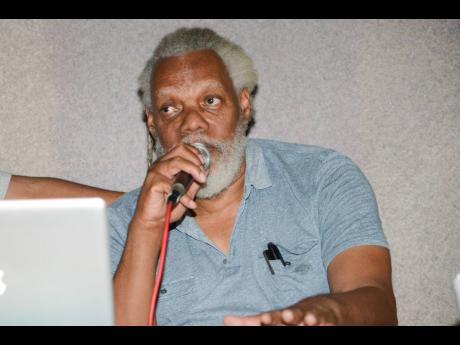Alliance Française de la Jamaïque shines light on Jamaican Patwa
“One han’ cyaa clap,” sums up the most recent programme by the Alliance Française de la Jamaïque (AFJ) — ‘The introduction to Jamaican Patwa’ — which is being offered to French speakers. That is also the bold statement on a poster with an image of theatre professional and renowned playwright Barbara Gloudon, who endorsed the programme.
AFJ aims to be a bridge between the local and Francophone cultures by teaching French, but according to Larry Lamartinière, there is space to share a piece of Jamaica’s native tongue with other countries, especially France and the French Caribbean.
“The Jamaican style of creole is a new thing to persons who are not from the island, but listen to the music. There are French speakers who have a good knowledge of the Jamaican music but do not understand a word the artistes are saying or the lyrics of songs they love,” the AFJ director told The Sunday Gleaner.
He added, “The case is especially true in the French Caribbean islands of Martinique (where I am from), Guadeloupe, and also French Guiana, where the reggae and dancehall genres are very big and influential.”
It is true that Jamaica creole positions itself in reggae and dancehall like abstract art painted on a canvas. The multihued language, commonly referred to as ‘patois’ or ‘patwa’ is vivid and filled with passion. zit is the reason many international creatives, from comedians to recording artistes, use it in their art. For this reason, the AFJ director said that they saw the need to introduce the programme, which was launched on Saturday, November 7.
For the first time since the AFJ was established on Jamaican soil in 1956, the organisation is exploring the concept of teaching patois to French individuals, using the work from artists as well as the work from dub poets, singers, and writers. Before this, in addition to French classes, they have organised events such as A Touch of France and played a role in the IFLE CARICOM programme, where French-speaking creatives could meet and collaborate with Jamaican creatives, but this, “satisfies another need”.
Lamartinière said, “Patois continues to have a powerful aura across the world, (so) while we teach French to the Jamaican people, there’s more to do from this side. Hence the phrase “one han’ cyaa clap” becomes relevant. We want to do more by exporting the island’s culture to French people, and this is a step in the right direction.”
TOP PRIORITY
Offering such a programme has always been a top priority, said the president of the board of the Alliance Française, Pierre Lemaire.
“When French artists or journalists come to Jamaica, they always ask us to help them in order to communicate in Jamaican creole. It is also important that our audience understood that the Jamaican culture is much more than music, and that the ‘Jamaican Patwa’ is a vehicle for the culture,” said.
“With the COVID-19 situation, we had to do our classes online, and we then realised that this was the opportunity for our AFJ Jamaican teachers to teach Jamaican creole to French speakers, applying our knowledge of dynamic language teaching, combined with the high quality of the French spoken by our AFJ Jamaican teachers. We came to the conclusion we had a winning combination,” he continued.
Veteran reggae musician and educator Ibo Cooper agreed that the programme is an avenue for cultural expression and exchange. He, too, uses patois as an educational tool.
“I actually have a method of teaching English using patois, which started in my home, with my own children. Jamaicans are quick to translate from patois to English, where if we educated the youth using the language, we would realise the benefits,” Cooper said.
He added, “I have seen actual examples in other Caribbean countries like the ABC islands (Aruba, Bonaire, and Curaçao) that are primarily Dutch-speaking, but by the age of 10, a child in those islands speaks Papiamento, which is another form of creole. It can be used to impact social change.”
Other industry professionals who have endorsed the programme are comedian writer and educator Owen “Blakka” Ellis and budding young reggae singer, 5 Star Celestial.
The programme, which started with a free Zoom introduction session, has been receiving great feedback from the registered students and continues until the end of the year. More than 40 participants from France, Martinique, Guadeloupe, Canada, Brazil, and even South Africa participated.

